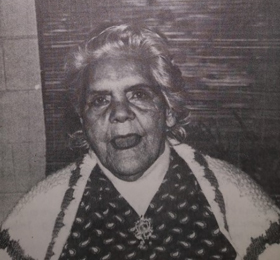Autobiography of Aunty Lena Atkinson as told to Aunty Irene Thomas

My name is Lena Atkinson from Cummeragunga Mission. I married a man named Watson Atkinson from New South Wales. During our marriage we had eight children. Their name's are Watson. Richard, James, Kathy, Celia, Veronica, David and Ivy Atkinson.
My mother's name was Cissy Dunaly and her parents came from The Warnambool Region of Victoria. Cissy and her family were reared at Coranderrk Mission near Healesville, Victoria. My father's name was Alex Cooper and he came from Cummeragunga Mission, New South Wales.
I remember growing up at Cummera mission and attending the local school. My teacher’s name was Mr. Allen Burridge. He loved our people very much and supported all the families on the mission. There were many students going to school at that time. The mission had many people living there but we only went to grade 3 or 4. When we moved to the Victorian side of the border, the Buxs’, the James’ and Coopers’ all lived along side and we enjoyed being together. When anyone was sick they all came and helped one another. The old people would cook up plenty of hot soup and share with each other. Emmanual and my brother Ruphert and myself remember swimming the Murray River to go to school. We would neatly fold our clothes and place them on my head and swim across to the other side. Sometimes the boats would be missing so we swam across and went off to school.
The family had a lot of football matches; there were huge processions. The Briggs and the James’ would put them on for entertainment and to the enjoyment of all. There were no problems and if anything did happen, the police were never called in. They handled their own problems. There were three midwives that I remember; Granny Maggie, Aunty Glora and Aunty Nora Charles. Grandpa James was the doctor and he use to send away for a lot of his herbs and medicines overseas. Sometimes the doctor from Echuca would come out and help Grandpa James. They use to have the old horse and Jinker.
The old people use to wash their clothes in large tins or drums. They would build a fire and place the tin or drum on bricks. Then they boiled their clothes and they came so white. They baked all their own bread and the men worked hard for the manager. They cared for the sheep, cattle and horses on the mission. They also harvested the crops and in return received rations for the family. Granny Maggie had a shop and use to sell groceries and ice cream and ginger beer. They had plenty of chooks and Granny Maggie and Pricilla James use to sell fresh eggs to all the mission families.
The huge steamer used to pull into the wharf. It often brought people and fresh supplies. A suit in those days cost three pounds. The steamer would lie loaded up with bags of sugar and big bags of flour and the steamer took away our wheat to the Echuca port. There was a really big saw-mill at Barmah where a lot of our men worked. My Dad worked there also Mary James's father. The Steamer would take away the bags to Echuca.
We had lots of dances in the big hall. Sally Briggs and the Coopers and Uncle Bob would do the Scottish jig. They had a piano accordion and violin and our old people loved to dance and sing. The White people in Barmah and our men worked with one another and they all got along well with one another. There was no prejudice that I remember.
I also remembered the strike and walk-off of Cummera in 1924. There were about 118 camped on the Victorian side of the Murray River and about 147 on the Cummera Mission. The White Manager was very antagonistic. There were poor conditions and a shortage of rations for the families. The final straw came when the Manager leased 200 acres to a local farmer. Many people walked off Cummera. Many half castes were not allowed on the mission. Those who crossed the river had to fend for themselves. The Victorian Government was only responsible for Lake Tyres Mission in those days.
I've seen a lot in my life time. I think this generation are having a hard battle and it's going to get worse. The government has not kept its word on land rights and many of the other important issues. My advice to the young people is to get a better education. Work hard to improve the situation. We are not getting together enough to talk out our problems. We should support one another much more then we shall find the answers to the problems that the next generation will have to face.
